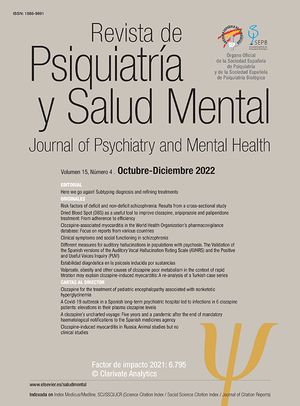Pediatric hospital at home (HaH) care1 is less restrictive than traditional hospital care (HC), though the two have certain key elements in common:
- -
Children are considered to be hospitalized and are thus offered total availability of the care team and priority assignation of a hospital bed if needed;
- -
The clinical situation of patients requires intensive care measures; and
- -
Therapy may involve restriction of personal freedom.
The opening of the Psychiatric Hospital at Home Unit (PHaHU) of the Niño Jesus Hospital raised the question of whether the restrictions imposed on patients could require judicial oversight, as patients’ right to freedom2 could be considered suspended. Given this unclear legal situation, judicial authorities were asked to uphold the measure.
All requests to intervene were denied, as the provisions set forth in article 763 of the Civil Procedure Law3 (CPL) were not considered applicable to home hospitalization.
This letter analyzes the possible reasoning behind the judicial resolutions:
- a)
Regarding the minor's clinical situation: Both HaH and traditional hospital admissions are justified by the existence of severe psychopathological alterations which require intensive management by medical specialists. The clinical profile of patients proposed for HaH admission must be considered comparable to that of patients admitted to conventional HC.
The suitability of one or another mode of care is based on other factors such as:
- -
Short-term prognosis: HaH is appropriate if immediate clinical worsening is not anticipated;
- -
The existence or absence of a serious risk to the patient's own life or that of others; and
- -
The quality of the family support network, as families must commit to following the instructions of the team and ensure that the minor is continuously supervised.
In HaH care, the minor must also agree to comply with the indications of the home hospitalization team.
Exclusion criteria for HaH admission are the presence of medical complications that require conventional HC, the existence of severe behavioral disorders that make HaH impossible, serious risk of self-harm, and lack of family support.
Therefore, the main distinction between HaH and conventional HC cases is not the severity of the condition itself, but whether the safety of the minor or their surroundings may be compromised, or if there is insufficient social and family support.
If article 763 of the CPL requires that hospitalization be justified by the mental disorder itself, and given that both in conventional HC and HaH care it is precisely the severity of the condition that justifies the measure, it does not seem that clinical criteria sufficiently support the lack of a need for judicial intervention in home admissions.
- b)
Regarding the treatment setting:
Hospital admissions entail a stay4 in an institution whose management and regulations are determined by parties other than the parents.
Section two of article 763 of the CPL makes express reference to the place of hospitalization, specifying that “hospitalization of minors shall always take place in a mental health institution that is appropriate to their age (…)”.
The home of the minor cannot be considered an “institution”, so admission for care delivered in this environment could be the main argument of the courts in refusing to allow or uphold a decision for in-home hospitalization. The realm of the home lies outside of the judicial scope, since restrictions imposed on minors in the context of HaH treatment are protected by the exercise of parental authority.
The Spanish Civil Code,5 in article 154, states that parents, under the obligations of parental authority, must “watch over [their children], have them in their company, feed them, raise them, and provide them with a comprehensive upbringing (…)”; for their part, children “must obey and respect their parents” (art. 155).
Limitations in HaH are within the power of authority granted to parents, as they must watch over children and safeguard their physical and mental health. The goal of therapy justifies the restrictions in the same way that parents and guardians may suspend leisure-time activities in the event of academic failure or bad behavior, and these measures are justified under the duty to raise and guide the child. Furthermore, “care and upbringing provided to a minor implies, normally and necessarily, decisions regarding the residence and the imposition of restrictions on their freedom (…) status libertatis is construed within the context of young age due to the demands deriving from guardianship and custody, one of which is to remain in the company of the holder of said authority” (Second Chamber of the Constitutional Court, ruling 94/2003, of May 19).6
In conclusion, patients either admitted under conventional HC or HaH present severe mental disorders. Differences in the place of admission may have formed the basis for judicial resolutions received by the PHaHU. HaH admissions must therefore proceed according to general guidelines of informed consent in children.7







